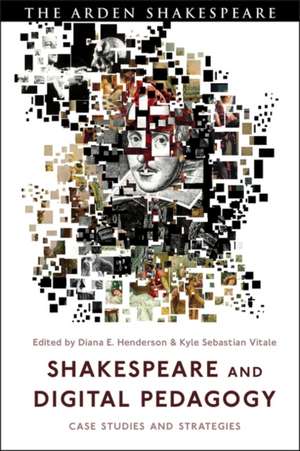Shakespeare and Digital Pedagogy: Case Studies and Strategies
Editat de Diana E. Henderson, Kyle Sebastian Vitaleen Limba Engleză Paperback – 15 dec 2021
| Toate formatele și edițiile | Preț | Express |
|---|---|---|
| Paperback (1) | 153.95 lei 3-5 săpt. | +28.43 lei 6-10 zile |
| Bloomsbury Publishing – 15 dec 2021 | 153.95 lei 3-5 săpt. | +28.43 lei 6-10 zile |
| Hardback (1) | 437.47 lei 6-8 săpt. | |
| Bloomsbury Publishing – 29 dec 2021 | 437.47 lei 6-8 săpt. |
Preț: 153.95 lei
Preț vechi: 166.74 lei
-8% Nou
Puncte Express: 231
Preț estimativ în valută:
29.46€ • 32.10$ • 24.82£
29.46€ • 32.10$ • 24.82£
Carte disponibilă
Livrare economică 02-16 aprilie
Livrare express 18-22 martie pentru 38.42 lei
Preluare comenzi: 021 569.72.76
Specificații
ISBN-13: 9781350109711
ISBN-10: 1350109711
Pagini: 232
Ilustrații: 10 bw illus
Dimensiuni: 156 x 234 x 15 mm
Greutate: 0.38 kg
Editura: Bloomsbury Publishing
Colecția The Arden Shakespeare
Locul publicării:London, United Kingdom
ISBN-10: 1350109711
Pagini: 232
Ilustrații: 10 bw illus
Dimensiuni: 156 x 234 x 15 mm
Greutate: 0.38 kg
Editura: Bloomsbury Publishing
Colecția The Arden Shakespeare
Locul publicării:London, United Kingdom
Caracteristici
Helpful
advice
on
designing,
creating
and
mounting
an
effective
digital
resource
for
teachingShakespeare
Notă biografică
Diana
E.
Hendersonis
the
Arthur
J.
Connor
Professor
of
Literature
at
MIT,
USA.
She
teaches,
publishes
and
edits
widely
in
the
fields
of
Shakespeare,
media
studies
and
early
modern
studies,
and
is
a
dramaturg,
designer
of
online
educational
modules
and
documentary
producer.Kyle
Sebastian
Vitaleis
Associate
Director
at
Temple
University's
Center
for
the
Advancement
of
Teaching,
USA.
Cuprins
List
of
figuresNotes
on
contributorsForewordMichael
Witmore
(Folger
Shakespeare
Library,
USA)IntroductionDiana
E.
Henderson
(MIT,
USA)and
Kyle
Sebastian
Vitale
(Temple
University
USA)Part
One
Teaching
Academic
and
Digital
Literacy1.
Shakespeare
Students
as
Scribes:
Documenting
the
Classroom
through
Collaborative
Digital
Note-takingCyrus
Mulready
(SUNY
New
Paltz,
USA)2.
TheShakespeare
CoLab:
a
Digital
Learning
Environment
for
Shakespeare
StudiesRachael
Deagman
Simonetta,
with
Melanie
Lo
(bothUniversity
of
Colorado,
Boulder,
USA)3.
'Reading
Strange
Matters':
Digital
Approaches
to
Early
Modern
Transnational
Print
HistoryKathryn
Vomero
Santos
(Trinity
University,
USA)Part
Two
Teaching
Diversity,
Equity,
and
Inclusion4.
(Early)
Modern
Literature:
Crossing
the
'Sonic
Color
Line'David
Sterling
Brown
(Binghamton
University
USA)5.
Diversifying
Shakespeare:
Intersections
of
Technology
and
IdentityMeg
Lota
Brown
and
Kyle
DiRoberto
(bothUniversity
of
Arizona,
USA)6.
The
British
Black
and
Asian
Shakespeare
Performance
Database:
Reclaiming
Theatre
HistoryJami
Rogers
(University
of
Warwick,
UK)7.
Reading
Interculturality
in
Class:
Contextualising
Global
Shakespeares
in
and
through
A|S|I|AEleine
Ng-Gagneux
(National
University
of
Singapore,
Singapore)Part
Three.
Teaching
with
Traditional
and
Modern
Archives8.
Shakespeare
at
BasecampKristen
Poole
with
Jake
Cohen
(University
of
Delaware,
USA)9.The
Victorian
Illustrated
Shakespeare
Archive:
Art
to
EnchantMichael
John
Goodman
(Cardiff
University,
UK)10.
Student-Curated
Archives
and
the
Digital
Design
of
Shakespeare
in
PerformanceMarcia
McDonald,
Joel
Overall,
and
Jayme
M.
Yeo
(all
Belmont
University,
USA)Part
Four
Teaching
in
Hybrid
and
Online
Learning
Environments11.
Performance
and
Pedagogy:
The
Global
Shakespeares
OnlineMerchant
of
VeniceCourseSarah
Connell
(Northeastern
University,
USA)12.
Translating
Shakespeare
from
Scene
to
Screen,
and
Back
Again:
Digital
Tools
for
TeachingRichard
IIILoreen
Giese
(Ohio
University,
USA)13.
Dividing
the
Kingdoms:
Interdisciplinary
Methods
for
Teaching
Shakespeare
to
UndergraduatesJaime
Goodrich
(Wayne
State
University,
USA),
with
Sarah
Noble
(Berkley,
Michigan,
USA)Part
Five
Teaching
in
Web
3.014.
Mapping
the
Global
Absent
in
Shakespeare:
Lessons
Learned
from
a
Student-Faculty
CollaborationJohn
S.
Garrison
with
Ahon
Gooptu
(both
Grinnell
College,
USA)15.
Shakespeare
Reloaded'sShakeserendipityGame:
Pedagogy
at
the
Edge
of
ChaosLiam
E.
Semler
(University
of
Sydney,
Australia)A
Closing
NoteDiana
E.
Henderson
and
Kyle
Sebastian
Vitale
Recenzii
To
read
this
volume
is
to
encounter
the
richly
generative
creativity
and
expansive
pedagogical
imagination
of
scholar-teachers
who
have
gathered
at
the
nexus
of
Shakespeare
and
Digital
Pedagogy.
Carefully
curated
by
Henderson
and
Vitale,
the
essays
collected
here
provide
inspiring
case
studies
and
generalizable
strategies
of
wide
interest
to
literary
scholars
and
practitioners
in
educational
development.
The
volume
illuminates
the
many
affordances
of
digital
technologies
in
the
classroom
(physical
and
virtual)
while
asserting
the
winning
claim
that
Shakespearean
pedagogies
are
at
their
best
when
active,
co-creative,
and
fully
inclusive-indeed,
one
of
the
advantages
of
digital
technology
is
the
potential
to
diminish
hierarchies
of
power
and
inspire
co-creative
action
as
a
path
to
meaningful
and
persistent
interpretation.
The
volume
will
be
warmly
welcomed
and
widely
embraced.
